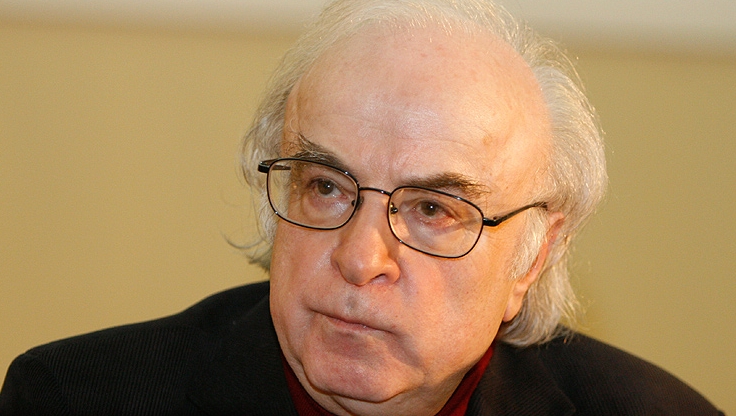Romania’s underdog of hope

By Norman Manea
Professor of European Studies and Culture and Writer in Residence at Bard College, is the author of Vizuina (The Lair), published in Romania in 2010.
The results of the recent Romanian presidential election were a happy surprise. Despite mounting a well-funded and ruthless campaign based on nationalism and religious devotion, Victor Ponta, the candidate of the Social Democratic Party (PSD) and current prime minister, lost to Klaus Werner Iohannis, the first Romanian president to come from an ethnic minority.
The outcome is as significant as it was shocking. With a huge political apparatus, the support of the Orthodox Church, the revival of the levers of corruption so often used in Romanian politics, and a victory in the first round, Ponta’s triumph seemed all but certain. Yet the underdog won by a comfortable margin. What does this mean for Romanian democracy?
Iohannis’s victory may well be as important a milestone for Romanian democracy as the bloody 1989 revolution that led to the overthrow and execution of the communist leader Nicolae Ceaușescu. The difference, of course, is that Romanians had to launch violent protests to escape the communist dictatorship that had brought them 42 years of suffering; today, they are working within a peaceful political process. But, then and now, Romania’s government pushed people beyond their limit.
Indeed, the election result was less a vote for Iohannis’s Christian Liberal Alliance than a vote against the “leftist” PSD, with its unenviable record in office, and the PSD’s political enemy on the right, the Democratic Party, led by Romania’s autocratic and unpopular outgoing president Traian Băsescu. The electorate seemed tired of the persistent confrontation between Băsescu and Ponta, and, more generally, of the noisy, ugly, and treacherous burlesque that their country’s political scene has become.
In his many successful years as mayor of Sibiu, Iohannis distinguished himself from the charismatic and shrewd politicians to whom Romanians are accustomed, proving to be a sober, laconic, and pragmatic administrator. This demeanor is part of what made it so difficult to predict his victory over the more talkative Ponta.
But Iohannis is different not only in his political approach; he is an Evangelical Lutheran in a largely Orthodox country. The vigorous religious attacks mounted against him during the campaign highlighted that fact’s salience for the establishment – though the Orthodox leaders who backed Ponta have rapidly adjusted their rhetoric to promote tolerance and cooperation.
Iohannis represents the ethnic German minority in Transylvania, a community that, despite having an 800-year history in Romania, has now almost entirely emigrated to Germany. It is no coincidence that the PSD allied itself with the xenophobic Greater Romania Party during the campaign. Ultranationalism lacks much relevance nowadays, and the party’s loud and vulgar former leader, Corneliu Vadim Tudor, is now but a defeated dreamer. That, however, did not stop the PSD from mobilizing chauvinists against Ponta’s not quite “Romanian” opponent.
But typical nationalistic slogans were not enough this time. Romanians viewed the government’s annulment of prison sentences for corrupt parliamentarians and some members of the financial elite as a clear sign of complicity. And the activist Andrei Ursu’s recent 17-day hunger strike – a protest against official manipulation and impunity regarding the death of his father during a brutal interrogation by the communist police in 1985 – reminded Romanians of their own experiences with government cover-ups of official criminality.
As if that were not enough, the government’s chronic duplicity was highlighted during the first round of the election, when a large number of Romanians living abroad were blocked from voting. Protests erupted not only in Bucharest, but also in Paris, London, Brussels, and Rome. Romania’s foreign minister, Titus Corlățean, was forced to resign and, in the runoff, the number of Romanians voting abroad doubled.
The final factor driving Iohannis’s victory was the younger generation, in whom connections with the Western world have imbued an eagerness to see real democratic progress in Romania. When the results were announced, their euphoria was overwhelming. In Bucharest’s University Square, the celebration recalled the energy of 1989; it was the sound of an awakened electorate, aware of its previous mistakes and ready for a fresh start.
Iohannis may also have benefited, to some extent, from an association in voters’ minds with the German Hohenzollern kings who ruled Romania wisely and with dedication for more than 80 years. And, indeed, upon learning of his victory, Iohannis immediately paid a visit to King Michael I (a Hohenzollern prince until he renounced the title in 2011).
Bolstering Romania’s prospects further, German Chancellor Angela Merkel has pledged to support Romania’s new government with both advice and action. Given the challenges ahead, such support will be sorely needed.
First, in order to enhance Romania’s stability in a tumultuous context, Iohannis must deepen the country’s alliance with the West. Second, he must fight for a radical political shift at home, from long-prevailing corruption to responsible governance, underpinned by an effective and transparent judicial system. Iohannis acknowledged both imperatives in his first public declaration.
It is not unreasonable to hope that Iohannis will advance Romania’s political development. That would be good news not only for the country, but also for an international community beleaguered by instability and conflict. After all, the more countries that have effective governments and fair political systems, uphold human rights and the rule of law, and create opportunities for their citizens, the better off the world will be. One hopes that, with Iohannis in charge, Romania will become one of them.
